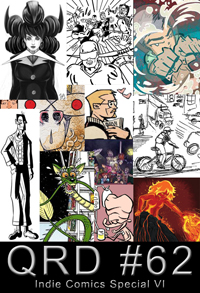
 |
| about
this issue Indie Comic Creator Interviews: Jay Payne Steven Myers William Dean Blankenship, Jr Ted Intorcio Lucas Herr Troy-Jeffrey Allen Jeff Gibbons Brian Hagen Nils Balls Eric Grissom Eric Ratcliffe Steve Peters |
 |
 |
 |
 |
 |
 |
 |
|
|
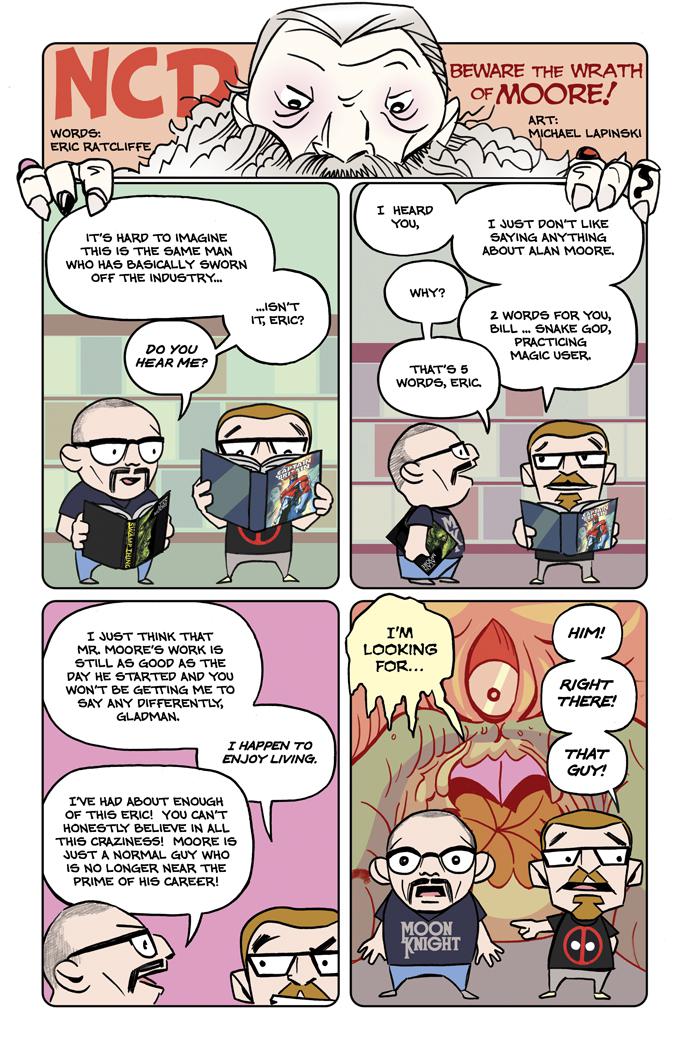 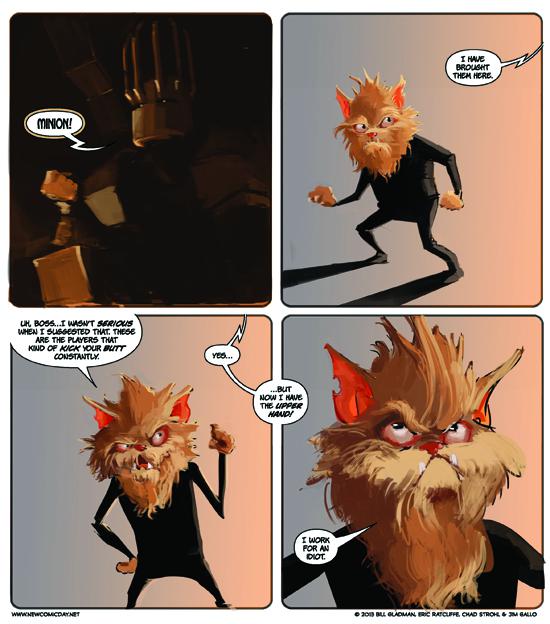 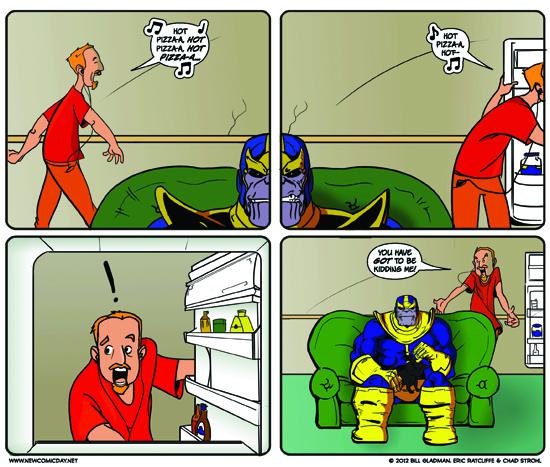 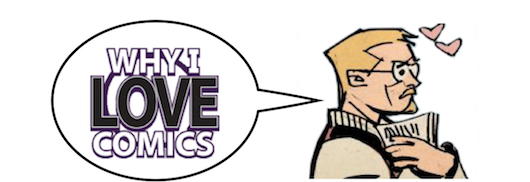             |
May 2013

City: Holden, Massachusetts
Comics: New Comic Day
Websites: www.newcomicday.net, lovecomics.libsyn.com
QRD – How old were you when you first got into comics & did you always stick with them or did you come back to them?
Eric – Probably around first or second grade. When I started to learn how to read, comics were just as much a part of that as the books they would teach you with that. I always read ahead of everyone else when I learned. I can remember obsessively picking up stuff from Walden books (which doesn’t exist anymore) as my mom would pick up a whole bunch of books, she got me around 15-20 comics. My parents have always been hugely supportive of my nerdiness, whether it be comics, gaming, horror stuff, sci fi (I was huge on the Power Rangers & the Teenage Mutant Ninja Turtles). But yeah as soon as I could read, I was reading comics. I think I lapsed for 2 or 3 years when I was in middle school, but would pick up the occasional collections that Marvel would release. Heck I didn’t start reading DC until JSA Stealing Thunder.
QRD – What was the first comic book you ever bought?
Eric – That I myself bought? I honestly can’t even remember. I think it may have been something from right when the Ultimate line came out. They had these huge like 60 page giant collections that would have Spider-Man team up & X-men stories in them. First comics that were bought for me were these random collections of reprints that my parents picked up from BJ’s (which is a whole goods store up here in Massachusetts). The reason I remember it is because one of my first real memories was getting a copy of West Coast Avengers #100 in there. Bobbi & Clint were my first Avengers & her death was one of my first real major memories as a young comic reader. (Which I think is one of the reasons I was so excited about her coming back in Secret Invasion & becoming friends with Jim McCann as he wrote Reunion).
QRD – How old were you when you put out your first comic?
Eric – It was September of 2010, so I just turned 21 (my birthday is in May). I almost started tearing up because it really was a dream come true. Holding something that you created in your hands is just a very surreal experience. At least it was for me.
QRD – What decade do you think produced the best comics?
Eric – I honestly wouldn’t single out a single decade because even when the industry almost crashed during the 90s, there were still some very good books coming out. Late 60s/early 70s you had Jack Kirby experimenting & creating some of the most iconic characters of all time. Of course you also had the birth of many of the characters we all know & love today. The 70s had characters like Werewolf by Night, Man-Thing, & The Legion of Superheroes. The 80s had Watchmen & The Dark Knight Returns, Walt Simonson’s Thor & even the 90s had things like Starman. I know it’s kind of a scapegoat answer; but seriously, I can honestly say being a reader who has specifically gone back & found older material to check out & read, no single decade can be singled out as the best of the industry. Even the 2000s had Morrison’s New X-men, Wolverine’s Origin Revealed, BKV’s Runaways/Ex Machina & Y the Last Man. I really could go on forever.
QRD – Why comics instead of just writing or drawing?
Eric – Because I honestly can’t write prose to save my life. I’m not big on details, which is embarrassing to admit. Plus the only thing I’m actually good at drawing wise is cartoony eyes, that’s about it. I’ve always enjoyed writing dialogue & having characters talk to each other. A huge reason I started writing in general was thanks to some of Kevin Smith’s movies & stuff like Jim Butcher’s Dresden Files novels.
QRD – Do you see mini-comics & indie comics as paths to mainstream comics or as their own unique media?
Eric – Definitely their own unique media. If you create an indie comic you really can play in any universe or genre you want.
QRD – How many copies of your comic do you print in your first run?
Eric – At the time we had 5 people on the team for New Comic Day. It was myself, Bill Gladman, Lisa Moore, Chad Strohl & Brant Fowler. We decided to do a print run that gave each person either 10 or 15 copies, I think it was 15. Ended up giving most of my copies to people like Claudio Sanchez & his wife Chondra, Tim Seeley, & a few others whose work I’d been reading & enjoying for years & who I’d had the pleasure of talking to & getting to know for a while. My second print run was about 80 copies for my first ever Boston Comic Con that I had a table at. I was still a rookie to the whole process & was thinking/hoping that I’d sell a lot of copies. Fun story: that did not happen. That first show I think I sold 12 copies of the book, which is still good for my first time having a table, but I let my imagination get the best of me.
QRD – How much do you think comics should cost?
Eric – I’m sure if we all had our way, comics would still be less than 2 dollars. Heck, I really think digital comics should be a dollar at most. It sure as heck seems to be working successfully for Monkeybrain. I get inflation & I get a constant changing economy, but when a lot of mainstream material takes you less than 10 minutes to read one issue of a comic that you just spent 4 dollars on…there’s an issue. I actually have started waiting more & more for trades & hardcovers & less single issues. I do go occasionally back issue hunting, but I think something needs to be done with the way the current market is run. (I swear this is the only time you’re going to read me being negative about comics in general.)
QRD – How many books do you produce a year & how many would you like to?
Eric – I write at least 52 strips a year, 4 a month. For a while we were bi-weekly so it was 8 a month. Eventually I’d like to get back to that, but right now it’s good to recharge my batteries & not go too crazy. It’s kind of interesting to look back at when we first started doing the strip & then see how much has changed since then.
QRD – Do you think stories should be serialized or delivered as complete works?
Eric – I think it depends on the story. Personally, I love original graphic novels as much as I enjoy single issues. Stuff like Pride of Baghdad or Batman: The Killing Joke are amazing, but at the same time collected stories are just as fun. Not to mention depending on the writer, single issues can completely kill it & tell amazing stories. Like Punisher War Zone, Fraction hit it out of the park with that funeral issue or Slott’s She-Hulk which was full of very small & fun arcs.
QRD – How are comic strips different than comic books & which medium do you prefer?
Eric – I have to write in 4 panels weekly instead of 22 pages monthly. It’s a huge difference & you really have to rework & think of pacing on a whole different scale. Panel 1 has to be the set up & panel 4 has to be your pay off & then you get to play a little bit. I feel like there are moments where I have a lot less freedom than your average comic does. I’ve actually had to rewrite strips a handful of time just to make sure it’s as tight as possible.
QRD – How long is it from when you start a comic until it’s printed?
Eric – I usually write 4-8 scripts at a time, depending on the ideas that pop into my head. Early Monday mornings George sends the finished pencils the rest of the team’s way, Alyssa colors them usually by Tuesday & then Brant letters the whole thing hours before it goes live on the site. So production wise I’d say it’s probably 4-5 days all together. To be put up weekly of course. It’s cool because we basically have a full comic team on a weekly webcomic.
QRD – What do you do better with your comics now than when you first started?
Eric – When I first started off I had no real process in how I wrote the strip. But now most of the time I’ll come up with the punchline first & then work backwards.
QRD – What kind of pens do you use?
Eric – Usually I’m just writing via my keyboard on my computer, but when I get ideas while I’m at conventions or just going for a walk or shopping I use a Pilot G-2 07. (Actually I think the 07 is the year looking at the pen, I’ve had these a while.) With blue ink. I really really love how these pens write & always buy them when I need them.
QRD – What does your workstation look like?
Eric – Embarrassingly enough, it’s covered in soda cans at the moment, really have to pick up around here. I have The Best of Eddie Guerrero DVD as well as some Digimon stuff I’m reviewing (lots of nostalgia) as well as a hardcover that has the best of 2000 AD. Lots of different pop culture being delved into as I work. Got my wireless mouse next to my laptop which I usually hold in my lap as I work, desk right next to me.
QRD – What do you think of digital comics & webcomics?
Eric – Love them! It’s what I work in, so I do my best to consume a bunch of them to influence my own work & style as well as regular comics. I read everything that Ryan Sohmer writes. (We’ve met several times & he’s a guy that helped kickstart why I do webcomics.)
QRD – Do you prefer working in color or black & white?
Eric – We’ve played in both, last year our Halloween arc was all black & white with some color used to very fun effects. (Plus I made a really awesome Critters joke.) I personally like the color material better as it’s a huge factor into our work.
QRD – How many different people should work on a comic & what should their jobs be?
Eric – At one time when my co-writer Bill Gladman was still on the strip, we had a team of 5. I think it honestly depends on the work. Most comics at least have a team of 4, not including the editor of course. We have myself on writing, Brant Fowler is letterer supreme, Alyssa Justice on colors, & George Amaru is our current artist.
QRD – How do you find collaborators?
Eric – I made a deal with a very ancient demon, which I’m sure will eventually come back to bite me pretty hard one day. Actually serious answer: pure luck & some very good friends. Jim Gallo who is currently on a brief hiatus from New Comic Day joined the team thanks to a Facebook post from my friend Jude Terror who helped promote that we were looking for a new artist. Alyssa & Brant both joined up because they were fans & George & I met at Boston Comic a few years ago. It’s all about networking & getting yourself out there, especially in this day & age.
QRD – How tight do you think a script should be as far as telling the artist what to draw?
Eric – I’m guilty of writing Marvel style so I may end up hypocritical here. My scripts are heavily dialogue focused (mostly because as I said above, I’m terrible with descriptions), but every artist I’ve worked with I’ve given enough freedom for them to really play with as much as possible. I don’t like scripting like an instruction book, I’d rather the artist really have them room to add & play with some stuff.
QRD – What comic book person would you be most flattered to be compared to?
Eric – Webcomic wise, I’d definitely love to be compared to Ryan Sohmer who I think is probably one of the best webcomic guys out there. Least I Could Do & Looking for Group are both amazing. Brian Michael Bendis would be a huge compliment to me, Brian K Vaughan, Tim Seeley, James Robinson.
QRD – What do your friends & family think of your comics?
Eric – Some of them have starred in them; but for the most part, all of my friends & family who know of my work are super supporting. They laugh at the jokes, give feedback & are just awesome in general. I’m a very lucky man to have the support system I do.
QRD – What do you think of superheroes?
Eric – Absolutely love them, always will.
QRD – Marvel or DC?
Eric – All of the above. Lots of independent stuff too.
QRD – What comic characters other than your own would you like to work with?
Eric – Deadpool, just one of these days I would love to get my hands on the merc with a mouth. Havok because I feel like he’s always been the better Summers brother & gets the short end of the stick. Would love to do a solo Thing series as I can remember reading the 80s solo series in back issues as a little kid & think Slott’s run was undercut completely.
QRD – Ideally would you self-publish?
Eric – Yeah, technically I already do. Just easier in general. Don’t have to worry about going through a middleman, you call the shots.
QRD – What conventions do you try to attend & why?
Eric – There are two every single year that I’ve been attending for about 6 years now. Those two are New York Comic Con & Boston Comic Con. New York was the first comic book convention I ever attended & flat out is the most comfortable & at home I’ve ever felt in my life. For the first time ever I didn’t feel awkward, I could be myself completely without worrying about anyone judging or making fun of me & it’s awesome. Boston Comic Con has become a show that I’ve loved watching evolve & change over time & really slowly start to compete with the bigger shows. It’s on my home turf so to speak & I’ve had a table at the last 3 shows (which has taught me a completely new side of the industry) & just as much as NYCC, I look forward to it every year. This year I started attending PAX East & I’m looking forward to covering it again next year. Really cool gaming convention.
QRD – What do you do to promote your books?
Eric – Social media is amazing & I think it’s become easy for people to promote their work. Whether it be Twitter, Facebook, Tumblr or any social media site; it’s ten times easier to get your name out there. (Unless you try Reddit, Reddit hates self-promotion.)
QRD – Do you think your comics are well suited to comic shops or would sell better elsewhere?
Eric – Well after almost 4 years, we still only have Volume 1. Still figuring out who to contact where to get it published digitally as well. Would absolutely love to have an app on smart devices. I do honestly think that it would sell very well in comic shops if that option was out there for us. Would love to do signings too. Like I mentioned, Boston Comic Con is where I learned about that side of the industry & I’m still a rookie on it.
QRD – What other medium would you like to see some of your comics made into (television, film, games, action figures, etc.)?
Eric – One of these days I would love to do a New Comic Day cartoon. If you read the strip, it’s pretty obvious that it would fit pretty easily into animation & I would love to do some voice over work (because when your character is yourself, it would be weird to have anyone else voice you right?). Also I would really love to do some New Comic Day stuff Thrilling Adventure Hour style. Which for those that don’t know is an amazing & hilarious podcast done in the style of an old radio show. I would really like to play with that myself one of these days in much smaller form.
QRD – Do you consider yourself a comic collector or a comic reader or both?
Eric – Both, I really don’t see myself as a collector. Mostly because I think the collector aspect of the hobby comes from eventually selling everything. But I collect to have these stories & books to re-read & let friends borrow & remember all the cool things I’ve read. So I guess I’m technically a collective reader if that makes sense? If it doesn’t make sense, then well I’m not sure what else to say.
QRD – What do you see as the most viable mediums for comics distribution 10 years from now?
Eric – I really hope Comixology grows bigger than what it is already. Maybe even getting into some print distribution. Wouldn’t mind seeing someone other than Diamond rising up into prominence. & of course seeing local comic shops thrive a bit more would be nice.
QRD – What would you like to see more people doing with comics?
Eric – Honestly? Take more risks, create your own characters & don’t be afraid to play with the digital market. I don’t think digital is going to kill the industry or hurt anything. If Mark Waid/Thrillbent & Chris Roberson/Monkeybrain can be successful at it, which they are, I really think more people should play in that field. Instead of limiting themselves to the 20-22 page format.
QRD – Anything else?
Eric – As well as New Comic Day I host a weekly podcast where I talk with the coolest people in pop culture. The podcast is called Why I Love Comics, but I don’t limit myself to just comics. I’ve had Mark Meer, Jane Espenson, Brian Michael Bendis, Doug Jones, Dan Milano, Bryan Q Miller, Jonathan Coulton, Greg Pak & so many more on the show. It’s something I love doing so I hope more people check it out, always appreciate when people do! I have a youtube channel that I’ve been doing a whole bunch more stuff on. I’m pretty sure it’s on the New Comic Day website, I do reviews & vlogs on there. I also most days manage to use my Twitter when I can either come up with something good to talk about or just flat rant about something. If you look up my name it’s pretty easy to find me. & yeah, thanks for interviewing me & checking out my work!
